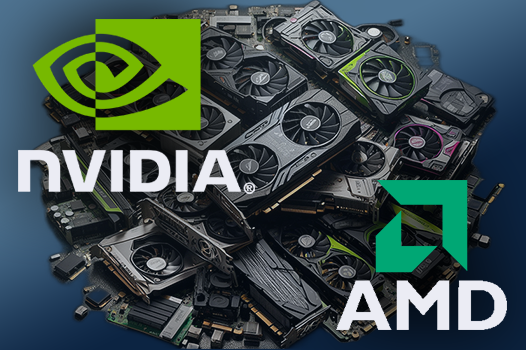GPU-AI Competition: AMD Radeon PRO vs. GeForce RTX 40 SUPER Series
GPU-AI Competition: AMD Radeon PRO vs. GeForce RTX 40 SUPER Series
 There has been buzz surrounding more powerful GPUs the last few years that are or could be equipped with AI features. Back in January, AMD CEO Lisa Su made a significant statement regarding the growth of the data center AI accelerated market. She projected a substantial increase, estimating that the market would grow by approximately 50% annually from $30 billion in 2023 to over $150 billion in 2027. However, recent developments have exceeded expectations. Lisa Su stated in January, “We're now expecting that the data center accelerator Tam will grow more than 70% annually over the next four years to over 400 billion in 2027.”
There has been buzz surrounding more powerful GPUs the last few years that are or could be equipped with AI features. Back in January, AMD CEO Lisa Su made a significant statement regarding the growth of the data center AI accelerated market. She projected a substantial increase, estimating that the market would grow by approximately 50% annually from $30 billion in 2023 to over $150 billion in 2027. However, recent developments have exceeded expectations. Lisa Su stated in January, “We're now expecting that the data center accelerator Tam will grow more than 70% annually over the next four years to over 400 billion in 2027.”
Over the last 18 months, there has been a significant uptick in news coverage surrounding the progress and ongoing innovations from both NVIDIA and AMD. This surge in attention highlights the intense competition between the two leading GPU companies. Let us explore two prominent contenders: the AMD Radeon™ PRO W7000 and the GeForce RTX 40 SUPER Series.
Performance and Versatility:
For developers and engineers working in 3D industries, both the AMD Radeon™ PRO W7000 and GeForce RTX 40 SUPER Series offer impressive performance and versatility. The Radeon™ PRO W7000, with its RDNA architecture, provides professionals with top-tier graphics processing and speed, essential for tasks like architectural visualization and digital twin creation. On the other hand, the GeForce RTX 40 SUPER Series, boasting NVIDIA's Ampere architecture and AI cores, delivers exceptional gaming performance and visual fidelity, catering to the needs of game developers and designers.
AI Integration:
AI integration is a game-changer for developers and engineers in 3D industries. The Radeon™ PRO W7000 utilizes AI to streamline workflows, automate repetitive tasks, and accelerate processes, allowing architects and engineers to focus more on design and innovation. Similarly, the GeForce RTX 40 SUPER Series employs AI-driven algorithms to optimize graphics settings, improve rendering speeds, and enhance overall performance, providing game developers with tools to create more immersive gaming experiences.
Competition Driving Innovation:
Competition between AMD and NVIDIA fuels innovation, driving both companies to push the boundaries of GPU technology. For developers and engineers in 3D industries, this means access to more powerful, efficient, and versatile GPUs. As AMD and NVIDIA strive to outdo each other, developers and engineers benefit from a wider range of tools and technologies, facilitating progress and innovation in fields like architectural design, urban planning, and virtual simulation.
Applications Across Industries:
The convergence of GPU and AI technologies has far-reaching implications across various industries. In gaming, AI-driven enhancements improve gameplay experiences, making virtual worlds more immersive and realistic. In architecture, GPUs accelerate rendering times and enable real-time visualization, revolutionizing the design process. For smart cities and digital twins, GPUs power simulations and analytics, facilitating urban planning and decision-making processes.
Future Prospects:
Looking ahead, the future of GPU and AI technology holds promise for developers and engineers in 3D industries. As both the AMD Radeon™ PRO W7000 and GeForce RTX 40 SUPER Series continue to evolve, developers can expect even greater advancements in performance, efficiency, and functionality. The competitive landscape between AMD and NVIDIA will continue to drive innovation, shaping the future of technology in gaming, architecture, smart cities, and beyond.
Future Facing:
Looking ahead, it will be intriguing to observe the future developments from both AMD and NVIDIA, as well as the potential emergence of new players into the market. In conclusion, the rivalry between AMD and NVIDIA serves as a catalyst for innovation and progress in the 3D industries. The AMD Radeon™ PRO W7000 and GeForce RTX 40 SUPER Series showcase the potential of GPU-AI synergy, empowering professionals to expand the horizons of creativity and innovation. As competition continues to intensify in the GPU market, developers and engineers can anticipate exciting advancements that will further elevate their work in gaming, architecture, smart cities, and digital twins.